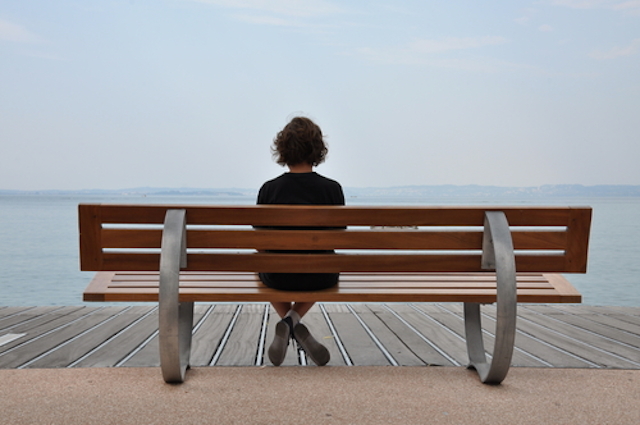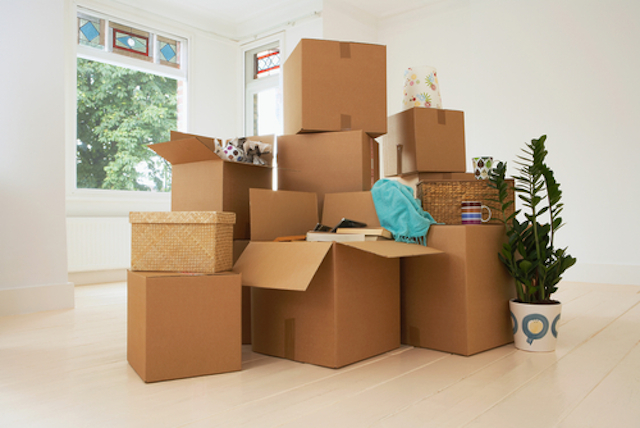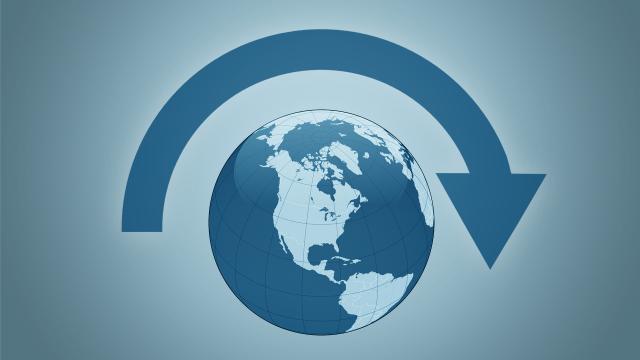Last year, my husband and I quit our jobs, sold everything we owned, and moved our family halfway around the world. We wanted to hit “reset”. At home, our lives had become eerily predictable. So we decided to gamble with everything that was comfortable and settled about our lives for a chance at adventure.
Images via Flegere, bikeriderlondon, and sdecoret (Shutterstock)
This post originally appeared on Medium.
Cape Town seemed like a good place to do that. My husband Ben is originally from Cape Town, and I lived in South Africa myself a while ago. So we sold everything, packed our bags, and moved our family (including the dog) halfway around the world. When we left, people admired our gumption. And we accepted their admiration, even as we nursed quiet doubts and fears about what we were doing.
This is the dream, right? You’re sitting at work, toiling away on another unsatisfying assignment, and you think: I could leave it all behind. I could hop on a plane tomorrow. I could live somewhere exotic. I could learn a new language. I could meet interesting people. I could take matters into my own hands and change my life.
Now, here we are. We’ve been in Cape Town for exactly a year. It’s been illuminating and inspiring. It’s been eye-opening. It’s shaken us up. It’s been all those things. But it hasn’t always been easy. Here’s what no one tells you about the big adventure.
You’ll Be Lonely

The perk of an experience like this is you get to start all over, and even reinvent yourself. But the flip side is no one knows you from anywhere. You crop up in a new place with no history, no context, no back story. Making new friends is daunting, even when you’ve gained the confidence and experience that comes with getting older. Our daughter, Penny, is nearly four, and she’s a little on the shy side. We’re always giving her the pep talk when she sees a potential friend at the park: Just go up to her and see if she wants to play.
Now that I’m working hard to make new friends, I see this scenario in a whole new light. We’re encouraging Penny to ask a question fraught with risk: “Will you be my friend?” I’m doing that almost daily right now, and it feels more vulnerable than I’d like to admit. There’s the very real possibility that someone will say no. But, the possibility that someone will say yes, and become the friend you’ve been waiting for, is too good to pass up. So, I keep asking, and I keep encouraging Penny to do the same.
Sometimes I feel like I’m in high school all over again. I left behind a circle of friends who not only loved me, but thought I was fun and funny. But here I am, 35-years old, the new girl in school, trying to figure out where I fit in and just hoping I’ll make the invite list. The social scene in Cape Town is well-established, and it lives up to its reputation of being an insider kind of place. Circles are tightly defined, and there aren’t usually any extra seats at the table.
Being on the outside looking in, we now realise that we were insiders at home. We had established our circle, and we weren’t really looking for new friends. We now wonder how many cool, interesting, inspiring people we were missing out on. So this is the reminder: even if you feel like you’ve found your people, always keep a few seats open at the table for friends you don’t know yet. As it turns out, we’re making friends with other people on the fringes — people who don’t naturally fit in to the scene here. Our friends are an ever-expanding circle of newbies, ex-pats, and otherwise mis-fits. I kind of love that.
You’ll Feel Vulnerable
Vulnerability is the plight of the risk-taker. Anyone who’s ever tried to do life differently, anyone who’s ever chosen to get off the preset path — knows what it means to be vulnerable. Turns out, going on a big adventure, is not so much about being confident, as it is being willing to be vulnerable. I’m starting to think vulnerability is a good sign. It means you’re far beyond the comforts that once hemmed you in — and you’re not playing it safe anymore. To be vulnerable is to be open to new situations, new people, new places, new ideas.
At home, we had it together. We were the pinnacle of 30-something American success. But when we came to South Africa, we didn’t have jobs. We didn’t have a car. We couldn’t open a bank account without my father-in-law to vouch for us. We had no idea where to send our kids to school. We had to find a co-signor just to get a mobile phone contract. It was humbling, and we needed a lot of help. But family, friends and strangers were eager to give us the help we needed.
Now, being a year in, I see us taking in people who are new to Cape Town. We can empathise with the fears and challenges in starting over. We’re passing on the advice and insights we received when we were fresh off the boat. I’m reminded that asking for help — and offering it — connects us to each other. At home, we weren’t vulnerable. We knew our way around. We had our people. We had a clear path forward. It was comfortable, but I know we were missing out. These days, we’re wide open.
Your Problems Don’t Go Away

Your problems don’t go away just because you went away. This seems obvious. It’s actually harder than you’d expect to see that, even though you’ve changed your whole life, the same old issues are still hounding you (some of them even more pronounced in the new situation).
The Walt Whitman poem “Song of the Open Road” is an anthem for travellers and independent souls. I get all caught up in freedom and possibility when the narrator takes to the open road, “strong and content.” But in a parenthetical, he confesses that his problems and burdens travel right along with him: “I carry them with me whenever I go / I swear it is impossible for me to get rid of them.”
It’s always tempting to believe that a change of scene will solve your problems. But it doesn’t really work that way. While changing scene doesn’t make your problems go away, it does give you fresh perspective to see these issues in a new way. It helps you break old patterns and behaviours. And now that you’ve changed your circumstances, you might have new realisations about your issues (like, maybe the dissatisfaction with your job wasn’t entirely the job’s fault). Once you’ve stripped away all the context and constructs that keep your issues under wraps, you have no choice but to tackle them. But for your efforts, you’re bound to arrive at a better version of yourself.
You’ll Wonder Why You Did This
When we’re having a rough week, we can get buried in homesickness. And homesickness is not rational at all, but a raging, wild emotion. In these moments, we ask ourselves: what the hell were we thinking?
Anytime you’re taking a huge risk or in the middle of a big adventure , you’ll have doubts. We try to give ourselves permission to indulge doubt when it comes, because it’s the way we feel, and it’s part of the experience. But we also try to cut it short before it turns into tailspin. Because tailspin keeps us from enjoying what’s positive, inspiring, and stretching about our current situation. In other words, it keeps us from being present.
In fending off the tailspin, we find ourselves going all the way back to the beginning of this story: Why did we decide to do this? Going back to the original motivation clears our heads. For these times, you need a mantra, a firm answer to the doubt. For us, we remind ourselves that: “This is our chance to hit reset on our lives.” Which is shorthand for, this is our chance to figure out who we really are and how we want to live the rest of our lives. With this reminder on repeat, we tighten our grip on the compass and carry on.
If I Had to Do It All Over Again…

I won’t lie to you. This experience isn’t exactly what I imagined it would be. But I’d still get on that plane a year ago. Maybe we need to justify this move, but I’m convinced we needed a change of geography to facilitate a change of direction. It’s not the fantasy. But ultimately, I have to believe it’s richer and more satisfying. I’d rather be living in an honest, hands-on way — even when it’s uncomfortable — than let life happen to me.
And as I’m discovering, the big adventure is not a place, an experience, or a plane ticket. The real big adventure is the thrill of a life (any life, anywhere) that’s lived honestly, deeply, and with intention. This kind of life doesn’t avoid questions, risk, or vulnerability. This kind of life is the one I want.
What No One Tells You About the Big Adventure [Medium]
Anna Adlard is a writer who lives in Cape Town. Find her @aadlard and at kansies.com.

Comments
17 responses to “What I Wish I’d Known Before Moving Halfway Around The World”
well, hello Captain Obvious
I can’t even grasp the concept of starting over. I met someone on Saturday night who had done exactly this, 6 years ago. I was intrigued at the thought, but almost immediately dismissed it as something I could never do. I also work with someone who did it. It’s funny when you ask them why? They tend to dance around the question, giving half asses weird reasons that make no real sense. I could probably understand it if you were in your early 20’s, but anything beyond that, and you’ve built a life by then. Must be running from something.
Apparently, less than 2% of the population of western countries die more than 100km from where they are born. Interestingly, this number hasn’t changed since the EU allowed free migration of citizens between member countries.
Yet – in Australia at least – we make it bloody difficult for even UK, USA, & Canadians to migrate freely, for fear that “they tirrrkk errrr JERRRBBSS!!”.
… Anyway, I’ll go and grind this axe elsewhere.
Well, I’m happy to be part of that 2% then. As it stands right now I’m living 15685km from where I was born. 🙂
(And furthest I’ve lived from place of birth is 16859km)
Welcome to the real world, the one that isn’t filled with American ‘dreams’ and propaganda.
No surprises. I spent 10 years trying to get OUT of Cape Town.
it gets easier when you have kids and start meeting people through schools, or through communities.
I have to agree with you. Me and wife moved from Brazil to Australia 5 years ago.
It’s been a rollercoster of ups and downs. Missing family and friends while trying to adapt to the environment. It’s not for everyone, definitely. But now we have 2 kids, our house, and everything seems to be on track. It takes a while before you find a group of people to start a friendship, but it will come.
We made the move from Germany to Australia three years ago, but I didn’t experience these things. For one thing, relocating overseas DID solve our biggest family problems. In Germany I had not enough time for the family, was working long hours and did many Monday to Friday business trips. In Australia I am home at five every day and we spend so much time outside with the kids (beaches, camping, BBQ, etc). We couldn’t do that in Germany. Life improved a lot. I also never felt lonely after we arrived, we made many new friends and always felt welcome. Not a single time I questioned our decision to come to Australia. So, thanks guys for making Australia such a great place!!! Best decision of my life!
Chiming in here as an American ex-pat coming up on 5 years in Australia this April. I’m 50 years old, with no family left. I was shafted out of $200K of unvested incentive compensation AND my job by a dishonest and jealous new manager back in the US, who used the GFC as a layoff excuse to deprive me of the golden handcuffs $$. I didn’t take kindly to it and ran to the other side of the world where things hadn’t yet gotten quite that crazy.
I empathise with all of the comments in this article. My big piece of advice on making friends and other connections is to find something you’re passionate about and throw yourself into it with nothing held back. Be the most involved, the person who’ll go door-knock when no one else has the time, the person who’ll send out the newsletter, whatever. This resulted in my having basically 2 full time jobs — my actual job and my volunteer activity. For the first month or so, people thought I was nuts and were afraid of me because I was just ALWAYS there to an extent they’d never seen before, and they were probably thinking that I had a bit of a mental issue. But as a couple months flew by and I was still as committed to what I was doing, as I was initially, people started coming up to me and chatting with me to find out my story. And then THOSE people introduced me to OTHER people, because they had decided I was worth knowing. In 3 months, I’ve DOUBLED my number of good friends that I’ve accumulated in the past 4+ years merely by doing something moderately useful that got people curious enough about me to talk to “the new girl”. I’ve been profiled on companies’ web sites and in the newspaper. Someone has (legitimately) inscribed my name on a mostly-hidden piece of city infrastructure as a tip-of-the-hat. ALL as a result of THIS ONE THING I decided I’d do. It doesn’t take as much as you think.
Now, can someone tell me the best place for a new permanent resident to get a Visa or MasterCard card?
Did the London to Sydney move nearly 3 years ago – I miss a couple of mates but have met similarly excellent companions here – i miss my dad – He’s on Skype very week – more then i used to speak to him in blighty – I miss the pubs but i am now no longer a fat alcoholic.
I don’t miss the weather, the ethnic slurry of immigrants, the smell or the shitty coastline.
I’ve now got my PR so here for life ! I am very happy and thankful I have a chance to start all over again in a country that hands in lost wallets and drops off lost phones.
Love you Sydney 🙂
People in glass houses and all that….
This
Careful of that Permanent Residency – it’s not as permanent as many think. As my wife was advised, it lapses after (8?) years.
She’s from Asia, you’re from England, they may treat you differently. As things stand, that talk was enough to inspire my wife to take up full Aussie Citizenship. THAT is for life!
I’ve been a permanent resident in Australia now since 1989. I’m from Asia too. Maybe there are different conditions for different countries? I am however considering taking citizenship. It’s cheaper than having to renew my visa every 5 years, and an Australian passport would certainly take out the massive hassles of filling in tourist visa applications for some countries, such as Canada or Japan.
Congratulations, you ARE the ethnic slurry. And adding to a problem decent people want to remove from the Aussie Psyche: Racial intolerance.
Oh, and I will add that the volunteer activity has absolutely zero to do with my career. BUT, because passionate people tend to attract other passionate people, I’ve struck up acquaintances with any number of people who are passionate about what they do and who are at the top of their game, some of whom have turned out to be professional contacts.
I moved to Australia in 1989. The move itself wasn’t such a big thing – as a diplomat’s kid, I had to move every few years anyway, and Australia was just the 12th or 13th country I was moving to . The difference here was that this time I was the one moving – by MY choice. And yes, even after 20 years, I don’t have the kind of long term friends that so many of my acquaintances have. Given my past though, I wasn’t ever going to have them. I’m over 50 now, kids grown up and moving out, and getting divorced. I reckon that’s a much bigger life change I’m having to deal with than moving countries. But I can appreciate a little how it might feel for people who’ve lived all their lives in the same place.
I did the opposite a few years ago – moved from ZA to Oz. I faced the exact same problems but luckily for me I found people who made it easier to overcome those same challenges. It still feels like an adventure some days and the same (if not a little better because it’s different) most days. Would I tell everyone to do it? No. But would I tell most people to do it? Hell yeah.
This is a really awesome post. It takes a lot of guts to admit that you face all these issues when moving. Don’t talk about halfway around the world either! Sometimes, people think that a little change in their life will make a difference, but the truth is it just reminds you that you need to buck up!